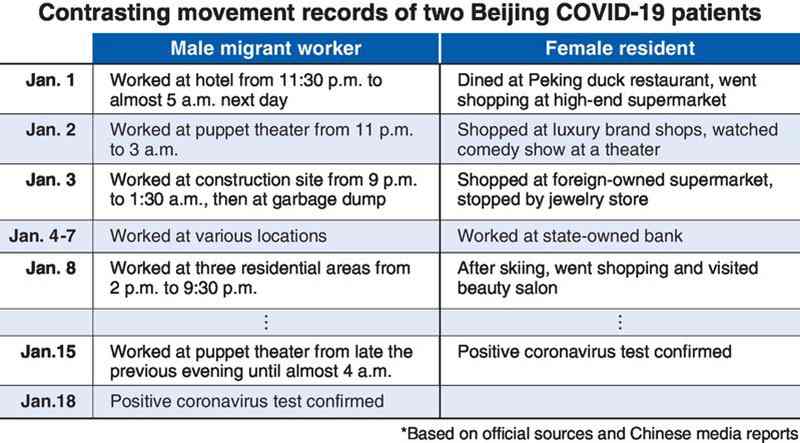
16:07 JST, February 15, 2022
BEIJING — The destitute lifestyle of a male migrant worker that was revealed after he caught the novel coronavirus last month triggered a huge response online and thrust the stubborn wealth disparities among Beijing’s residents under the microscope again.
Details of the 44-year-old man’s plight, who was dubbed “China’s hardest worker,” came to light after Beijing authorities revealed his movements in the days leading up to his positive coronavirus test.
The Chinese capital is currently hosting the Winter Olympics. Beijing authorities have been releasing the detailed movement history of people who caught the virus, with the aim of getting potential close contacts to come forward.
The migrant worker, who was confirmed to have caught the virus on Jan. 18, had been doing physically grueling work at a construction site from Jan. 1 to 15, mainly from late at night until early the following morning. The movement history of a woman living in the city, who caught the virus around the same time, revealed a lifestyle replete with shopping sprees at luxury brand stores and skiing trips. The stark differences in their wealth shone further attention on the worker’s life.
Search for missing son
According to Chinese magazines, weekly newspapers and other sources, the man was from Shandong Province and previously worked as a fisherman. In 2020, his then 19-year-old elder son disappeared, so the man started working as a day laborer in various locations while searching for his son. Carrying a 30-kilogram bag of sand or a 50-kilogram bag of cement earned him one yuan (about ¥18). With a daily income of 200 yuan to 300 yuan, the man reportedly supported his wife, second son — a junior high school student — and his parents, who were frequently sick.
As public interest in the man’s case soared, police authorities announced his son’s body had been found in a lake in Shandong in the summer of 2020. The man and his wife have not accepted their son’s death, but sympathy for the man’s life of hardship and constant misfortune grew even stronger.
The man rented an about 10-square-meter room in a house in the Beijing suburbs for 700 yuan per month. Finding such a cheap place to stay in central Beijing is impossible.
A 38-year-old transport company employee pointed at a collective housing complex near his home. This building had only a single gas cooking stove near the entrance.
“Buildings where migrant workers live have no toilets or baths,” the man said. “Houses like mine, which have a kitchen, are luxurious by comparison.”
A 58-year-old security guard who grew up in a farming village said, “Migrant workers from across the nation can relate to his situation. It really is a tough life.”
The administration of Chinese President Xi Jinping has touted “common prosperity” policies that aim to narrow the wealth gap. Consequently, the administration seems to be concerned that disparities brought to light by strict infection prevention measures that are deeply unpopular with the public could spark criticism of the government. Although the migrant worker’s movement history is still publicly available, related information remains hard to find on Chinese social media.
Top Articles in World
-

Israeli Ambassador to Japan Speaks about Japan’s Role in the Reconstruction of Gaza
-

Videos Plagiarized, Reposted with False Subtitles Claiming ‘Ryukyu Belongs to China’; Anti-China False Information Also Posted in Japan
-

North Korea Possibly Launches Ballistic Missile
-

Chinese Embassy in Japan Reiterates Call for Chinese People to Refrain from Traveling to Japan; Call Comes in Wake of ¥400 Mil. Robbery
-

Russia: Visa Required for Visiting Graves in Northern Territories, Lifting of Sanctions Also Necessary
JN ACCESS RANKING
-

Japan PM Takaichi’s Cabinet Resigns en Masse
-

Japan Institute to Use Domestic Commercial Optical Lattice Clock to Set Japan Standard Time
-

Israeli Ambassador to Japan Speaks about Japan’s Role in the Reconstruction of Gaza
-

Man Infected with Measles Reportedly Dined at Restaurant in Tokyo Station
-

Videos Plagiarized, Reposted with False Subtitles Claiming ‘Ryukyu Belongs to China’; Anti-China False Information Also Posted in Japan























